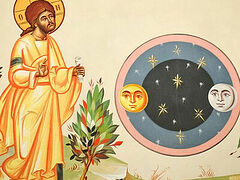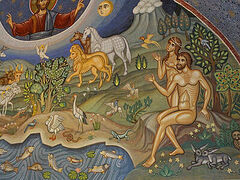Part 1: The Gospel of Adam, Abel, Abraham and Jesus
II. Forbidden Fruit
For the sake of love, God blessed Adam and Eve with hundreds of beautiful trees, bearing an abundance of delicious fruit.
And also for the sake of love, in the midst of the garden, God planted the tree of knowledge of good and evil, a special tree with a special purpose. Even before creating Eve, God had carefully warned Adam:
Of every tree of the garden you may freely eat; but of the tree of the knowledge of good and evil you shall not eat, for in the day that you eat of it you shall surely die.[1]
This was a gentle warning of necessary cause-and-effect, not a threat of punishment,[2] for God did not make death.[3] God is Life, and is the Source of all life,[4] so if Adam turned away from God and broke His commandment, he would be turning away from Life itself. This would inevitably result in death, and God wanted him to avoid such a fate.
This good tree provided Adam and Eve with a blessed opportunity to show their love for God. By trusting Him, patiently waiting, and obeying His simple command, they could demonstrate their love for the One who had created them. This gentle arrangement ensured that their relationship with God would be based on genuine love and freedom, not necessity.[5] If they loved Him, they would keep His commandment.[6]
Adam and Eve were created in the Image of God,[7] and their life in Eden was a happy one.
But a crafty serpent was lurking in the garden, jealous and envious of the blessings mankind had received. With no opportunity to attack God directly, he determined to attack God’s image, and to destroy it by any means possible. As the father of deception, he planted seeds of doubt, tempting Eve to question the good character of God, suggesting that the One who had given her life and love was actually cruel and stingy, denying her access to greater heights of power and pleasure she thought she rightfully deserved.
Disobeying the command of God, Eve ate the forbidden fruit. Then she gave the fruit to her husband, who was with her, and he ate.[8]
Their eyes were opened, and they knew they were naked. They received no new powers or pleasures as a result of their sin. Shame and fear were their only discoveries. As a covering, to hide from God and from each other, they sewed fig leaves together, fashioning rudimentary clothes for themselves, vainly trying to cover their nakedness.[9]
They hid from the face of God, but God did not hide His face from them. He walked in the garden, in the cool of the day, seeking fellowship with His people. But sadly, His people were no longer seeking fellowship with Him.
“What have you done?”, asked the Lord.
Instead of humbly repenting of his sin, Adam blamed his wife for giving him the forbidden fruit. And instead of humbly admitting her wrongdoing, Eve blamed the serpent for tempting her.
So the Lord God said to the serpent:
Because you have done this, You are cursed more than all cattle, And more than every beast of the field; On your belly you shall go, And you shall eat dust All the days of your life. And I will put enmity Between you and the woman, And between your seed and her Seed; He shall bruise your head, And you shall bruise His heel.[10]
In this second prophecy of the Second Adam, the great war of the ages had materialized:
God had created Man from the dust, and now the serpent was to eat dust all the days of his life. Hungry as a prowling lion, the bloodthirsty serpent would seek to devour mankind.[11] His ultimate attack would come upon a Man who would be born of a Virgin, and the seed of the serpent would strike the Seed of the Woman.
But just as the First Adam had risen from sleep, the Second Adam would rise from death, and in ultimate triumph, the Seed of the Woman would crush the serpent’s head.
For both Adams, the wounded side was a prelude, not to destruction or decay, but to a royal wedding.
For the sake of His love for man, God had pronounced judgment on the serpent, prophesied his ulimate destruction, and promised the coming Savior.
III. The Gift of Sorrow
Adam and Eve had all of their physical needs met. For sustaining physical life, they lacked no good thing.
But turning away from the Source of Life, and heeding the voice of the Serpent, they had damaged their spiritual existence, and had invited death into their souls. Their souls needed healing, and they could not heal themselves.
What they now lacked, and what they desperately needed, were three things:
- Humility
- Gratitude
- Love
To restore a right relationship with God, they needed to be humbled, and to remember their complete dependence upon Him. Without Him, they would have neither food, nor water, nor life itself. Instead of taking life for granted, they needed to be grateful to God for supplying all their needs. In response to His love, they needed to love Him and willingly return to Him.
For the sake of love, God provided His wayward children with pains and difficulties that would humble them, helping to lead them to repentance. Only by learning humility would they learn gratitude. And only by learning gratitude would they learn to love.
For the sake of love, God said to the woman:
I will greatly multiply your sorrow and your conception; In pain you shall bring forth children; Your desire shall be for your husband, And he shall rule over you.[12]
And for the sake of love, God said to Adam:
Because you have heeded the voice of your wife, and have eaten from the tree of which I commanded you, saying, ‘You shall not eat of it’: Cursed is the ground for your sake; In toil you shall eat of it All the days of your life. Both thorns and thistles it shall bring forth for you, And you shall eat the herb of the field. In the sweat of your face you shall eat bread Till you return to the ground, For out of it you were taken; For dust you are, And to dust you shall return.[13]
These words were spoken in love, not in anger. As a loving parent chastises a wayward child, God provided us with chastisement, to bring us back to our senses—to bring us back to Him.
Through the pain and toil of pregnancy and childbirth,[14] women would learn self-sacrifice for the sake of another—for the sake of the children they would bring into the world. And through this self-sacrifice they would have the opportunity to learn the meaning of love.
Through the pain and toil of working the ground, men would learn self-sacrifice for the sake of another—for the sake of supporting their wives and children. And through this self-sacrifice they would have the opportunity to learn the meaning of love.
Only by self-sacrifice was the First Adam able to have a bride.
Only by self-sacrifice was the Second Adam able to have a bride.
And only by self-sacrifice would God’s people acquire the humility, gratitude,
and love that was needed, to restore their relationship with their loving Creator.
Until their hearts could be healed, and the relationship restored, it would be disastrous for them to live forever. Their sin and selfishness, combined with an unending life, would cause nothing less than hell on earth. So, mercifully, as a restraint for sin, God sent them out of the garden, and prohibited access to the Tree of Life:
therefore the Lord God sent him out of the garden of Eden to till the ground from which he was taken. So He drove out the man; and He placed cherubim at the east of the garden of Eden, and a flaming sword which turned every way, to guard the way to the tree of life.[15]
Death was not a harsh judgment from an angry god, punishing them for sin.[16] As a loving Father, God permitted them to face the challenge of death, because He knew it would aid them on the quest for humility, repentance, and spiritual healing.[17]
Eventually, when the time was right, God would raise them from the dead and restore access to the Tree of Life. After the marriage supper of the Lamb, its leaves would be provided for the healing of the nations.[18] But that time was not yet. First, Adam and his children had to begin walking the long road of repentance.





